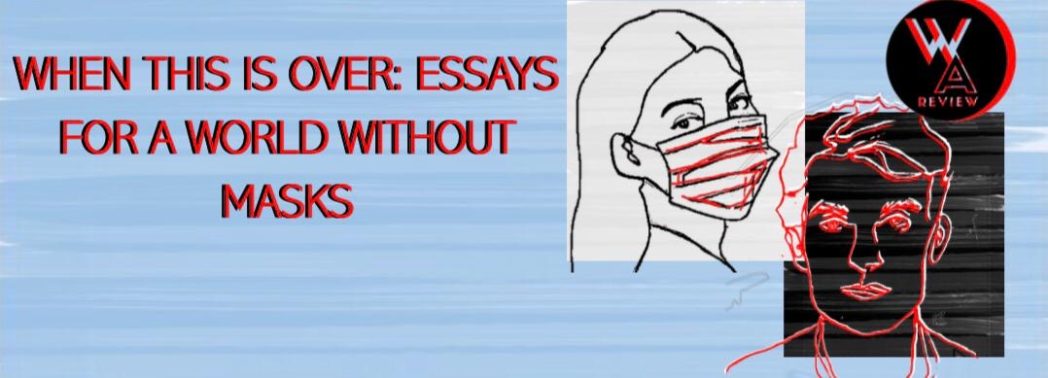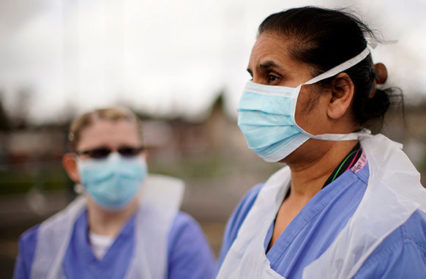Wales Arts Review asked some of Wales’s top writers to pen some thoughts on the future. This new series brings together a wide variety of perspectives and ideas in a vibrant array of styles and forms, expressing hopes for a new way of doing things when the Covid-19 coronavirus is finally overcome. Political, personal, sociological, ecological, cultural – this is an evolving tableau of ideas for the world as it is and how it might be. Here, Anna Lewis calls for artists to make visible those we have found hard to see, from those with long term health conditions to those who care for them.
Death is a great and inescapable theme of art. Our awareness of mortality is a fundamental aspect of the human condition, and it has to exist in the work of any artist. Much of my own writing is concerned with history and the past, where death speaks loudest of all – the archaeological record is entirely populated by the dead.

But what I, at least, don’t tend to write about are those parts of life when we are unwell and when we are cared for. These periods of care are not generally rich in drama or action, or even in large emotions. They are lengthy, tedious, worrisome, and quietly sad. For literature, the best they may offer is pathos – or perhaps occasional comedy. But in reality, especially as people live longer, these episodes become increasingly significant proportions of our lives and of our stories.
I should know this as well as anyone. Both my parents are living with serious, debilitating health conditions and need assistance day and night. Before my mother’s own illness, she was for several years the sole and constant carer for my father. But I rarely write about sickness and I rarely write about care. I rarely talk about it either. Long-term ill-health, and the care that requires, impact on the lives of many of us, but the subject is not prominent in our society. Death, yes. Healing, yes. Ill-health or disability and its privations – no. This is evidenced by the recent push by the care sector to be acknowledged in the public conversations around Covid-19. Why were deaths in care homes and the community not originally included in the death toll? Why are care workers even more poorly-equipped than hospital staff? In other countries, there are stories of care home residents being found dead and abandoned in their beds. Why are these patients and the people who care for them invisible?
If there is one thing I would like to see result from the pandemic, it would be a revolution in social care provision. Just as all of us are entitled to free healthcare at the point of need from the NHS, so we all should be entitled to a good standard of free social and nursing care when we are unable to look after ourselves.
No one chooses debilitating ill health. At present, those paying their own care home fees are required to run down their savings and even sell their homes to fund their care, while those whose fees are paid by the council or NHS can be required to move to whichever place is offered – which may be far from family and friends, and in some cases can even mean that spouses are separated and placed apart. These are additional miseries on top of life-changing illness or injury. And – it hardly needs saying – the burden of funding free social care at the point of use must not fall on those already under most pressure. Austerity is not the cost of a socially responsible state: quite the opposite.
Along with a joined-up approach to health and social care provision, I would like to see the professionalisation of the care sector. I believe that care workers should need to obtain qualifications, to ensure a basic medical knowledge and understanding of different health conditions, consistent across the sector. In conjunction with this, care workers should receive payment in line with their responsibility: that of ensuring the day-to-day safety and well-being of some of our most vulnerable people. In the care sector as it currently stands, involving poorly-paid work with no professional entry requirements, instances of human trafficking and modern slavery are known. We all know about hand car washes and nail salons being potential hotspots for slavery – why are care homes yet again invisible?
So this is what I would like to see emerge from Covid-19. I don’t know what I can do to make it happen, beyond voting at every opportunity and at every level of election. What I can do, as a writer, is to make those who are unwell and those who care for them more visible. I can write about illness and care. It does not have to be dreary; ill health is a part of life, and caring for each other is the greatest thing we can do as human beings. Yes, the archaeological record is populated by the dead, but among them we can see those who lived for years with injuries, illnesses, disabilities. The marks of these ailments are in their bones. Their survival is proof that those around them cared.
Check out the other articles from Wales Arts Review’s ‘When This is Over’ Series.
Anna Lewis has won several awards for her poetry, including the G.S. Fraser Prize, the Robin Reeves Prize and the Christopher Tower Prize, and her story ‘Fruit’ won the Orange/ Harper’s Bazaar short story competition. Her latest collection, In Passing, is available now from Pindrop Press.












